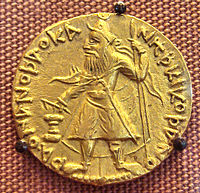উইকিশৈশব:এশিয়া/আফগানিস্তান
সাম্প্রতিক জ্ঞানের প্রতিফলনের জন্য এই পাতাটির হয়তো হালনাগাদ প্রয়োজন। আপনি এটি হালনাগাদ করে সাহায্য করতে পারেন। অগ্রগতি আলোচনা করুন, অথবা সাহায্য চান। |





আফগানিস্তান (Pashto/Dari: افغانستان), officially the Islamic Republic of Afghanistan, is a landlocked country in the Middle East. Afghanistan has a population of 32 million people, making it the 42nd most populated country in the world. The country's strategic location along the Silk Road allowed Afghanistan to have significant interactions with other cultures in the Middle East and other parts of Asia, justifying Afghanistan's extreme diversity.
Afghanistan's history spans over thousands and thousands of years. Records show that Afghanistan was home to many settlers that had fixed settlements accompanied by farming and the use of domesticated crops/animals (known as the Neolithic Era, final phase of the Stone Age). These settlements eventually grew to be massive civilizations. Eventually, Zoroastrianism flourished throughout Afghanistan with the oncoming of the Yaz culture from about 1500 BCE to 1100 BCE. Historians say that the lack of burials founded in relation to the Yaz Culture correlates to the Zorastrian belief of sky burials, which is where a human body (after death) is left at the top of a mountain to be taken away by "natural elements" (scavengers, wind, rain, etc.). After invasions by the Persians (in 6th century BCE) and Alexander the Great (in 4th century BCE), Buddhism and Hinduism took over as the major religion with the arrival of the Mauryan Indians from the Indian subcontinent. In the 7th century, Islam took over Afghanistan when Arab Muslims arrived. What followed afterwards were several centuries of Islamic ruling by various Islamic dynasties, such as the Saffarid and Ghurid dynasties.
Eventually, the British attempted to keep Afghanistan under long British ruling, with a couple of wars between the two parties. By 1919, the country was completely free of British influences. A monarchy was created promptly afterwards, which lasted until 1973 when political crisises forced the king out of his power (a coup took place). A republic, non-religious government was established until the Soviets invaded Afghanistan in 1979 after a Soviet-backed political party took over the government, sparking outrage and violent protests throughout the nation. The Soviets were met with the fierce fighting of the Mujahideen rebels, who were soldiers trained in neighbouring Pakistan to fight against the Soviets. The Soviet-Afghan war ended in February of 1989, resulting in the withdrawal of the Soviet troops. Various Afghan tribes started fighting each other for power over the nation, with the Taliban (Islamic militant group) emerging victorious over the other tribes in the 90s. They ruled with an iron fist, adhering to their strict version of the Islamic faith.
The Taliban were harshly criticized for their inhumane and cruel punishments and their severe restrictions on women's rights. They ruled the whole nation until the US invasion of Afghanistan in 2001 (occurring right after the 9/11 attacks), in which they were partially dethroned. This has caused conflicts between the Taliban and the Afghan government, resulting in many innocent civilian casualties over the past two decades. Although still facing many issues with the Taliban, Afghanistan improved tremendously ever since the partial dethronement of the Taliban, with improved women's rights and educational standards. This ended when they returned to power in 2021.
Its capital and largest city is Kabul and the the currency is the Afghan Afghanis
